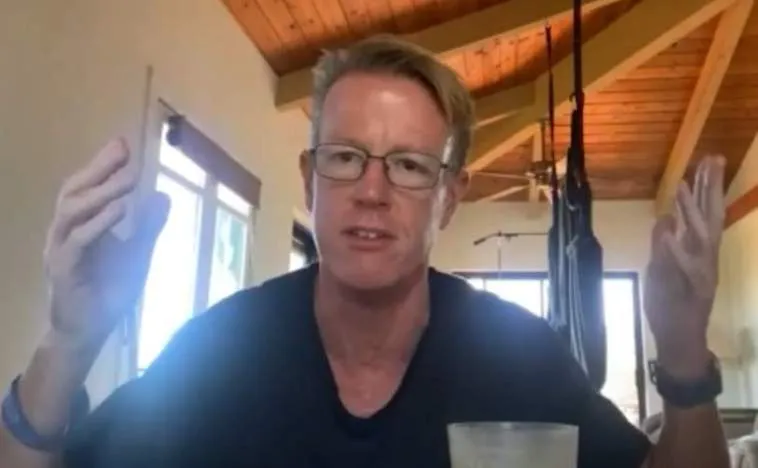Note from LifeSiteNews President Steve Jalsevac: The views presented in this article do not necessarily represent the view of LifeSiteNews. We are reprinting it for your consideration, especially considering that the article has been published by the Dr. Mercola and Robert F. Kennedy Jr’s Children’s Health Defense websites, both of whom we have found to provide exceptionally helpful and reliable research on issues related to Covid and globalist developments. This is also the latest in a series of articles by Mercola and CHD on the international financial system and the giant Blackrock and Vanguard corporations who control trillions of dollars of investments.
Story at a glance:
- Edward Dowd is a hedge fund “guru” and former equity portfolio manager for the largest asset manager in the world, BlackRock. Over the past two years, Dowd has courageously come forward to awaken people to the collateral damage of the COVID-19 pandemic.
- A global financial collapse is a mathematical certainty. Dowd predicts the collapse will begin in earnest within the next six to 24 months.
- COVID-19 provided cover for central banks and governments, allowing them to temporarily hide the reality that the financial system is crashing.
- COVID-19 also allowed for the erection of a control system to shield governments and central banks from the fallout of collapsing food, energy and finance systems. It allowed them to restrict travel and introduce digital IDs and central bank digital currencies by linking them together with vaccine passports.
- Insurance companies report a 40% increase in excess mortality among working-age adults during the fourth quarter of 2021. Millennials aged 25 to 44 had an 84% increase in excess mortality in that same timeframe. Since the rollout of the COVID-19 jabs, the number of Americans who claim to be disabled has risen by at least 10%, possibly more.
(Mercola) – In the video below, I interview Edward Dowd, a hedge fund “guru” and former equity portfolio manager for BlackRock, one of the two largest asset managers in the world, Vanguard being the other. Over the past two years, Dowd has courageously come forward to awaken people to the collateral damage of the COVID-19 pandemic.
For example, in early March 2022, Dowd shared mortality statistics on Steve Bannon’s War Room, showing Millennials aged 25 to 44 had an 84% increase in excess mortality during the fall of 2021.
An education in booms and busts
Dowd became interested in finance right out of college. He got a job with HSBC Holdings, the largest bank in Europe, as an institutional, fixed-income salesperson, selling bonds.
“That was a five-year education in what really happens in the capital markets,” he says, “and everything you learn in the textbooks is garbage … I learned about Wall Street, how it worked and how it was incentivized.”
Dowd continues:
Back when I was a bond salesman from 1990 to ’95, there were a bunch of scandals. Wall Street is basically a boom and bust operation. There’s usually a boom created by the Federal Reserve that puts money into the system.
They don’t control where their money goes and Wall Street takes advantage of that. And usually it ends in fraud
The scandal in the early ’90s was the fraud with the mortgage-backed securities. There was a big Wall Street firm that went under because they had some trades in the drawer. Computer systems weren’t as robust, so some traders were hiding losses and that firm went belly up.
Interestingly enough, BlackRock at the time helped fix that problem. They had computer systems [the Aladdin system] that helped analyze the mortgage-backed securities … it’s just risk management software basically.
So, I learned the engines of Wall Street, but I wanted to get into the stock business. I went back to business school at Indiana University, graduated in ’97 and went to Wall Street to Donaldson, Lufkin & Jenrette, where I was an electric utility analyst down the hall from the internet folks who were doing all the IPOs [initial public offerings].
Basically, fraud on the IPOs was at every investment house, and it wasn’t hard fraud, it was soft fraud. They just were not doing the due diligence that the institutions used to do. Before they would IPO a company, they would make sure that the company had things like revenues, and in the late ‘90s that went by the wayside.
So, a lot of firms without revenues and just ideas were IPO’d … Eventually the Fed [Federal Reserve] did what they do. They tightened interest rates, the bubble popped and a whole host of corporate fraud was exposed: WorldCom, Enron, Lucent Technologies, Nortel Networks.
After that bust, the Federal Reserve went back to printing money and, in 2008, the real estate bubble burst, resulting in a massive recession.
I describe the forces at work — then, and now — in “Who Is Behind the Economic Collapse?” At the time of that economic collapse, Dowd was working for State Street Investment Research, which was bought up by BlackRock.
Asset managers and the global cabal
To many, BlackRock appears to play an important role in the globalist cabal’s effort to usher in The Great Reset. Dowd, having signed a non-disparagement agreement, is not free to discuss his views on BlackRock, but he can talk about similar players, such as Blackstone and Vanguard, the latter of which is a similarly sized institution.
Dowd says:
I don’t believe they control these corporations [the companies they own shares in], but they have undue influence, which Charlie Munger of Berkshire Hathaway has written about.
Basically, because of the growth of passive ETFs [exchange-traded funds] the voting of those shares goes to the senior executives of the firm. And so, there is some influence at Vanguard over some of the board votes.
Back in the day … most of the money inequities were managed by fundamental portfolio managers. I used to vote for the board but because we were so busy, we had like 80 companies in our portfolio, there was a firm called Institutional Shareholder Services, ISS, which would help us figure out the votes.
It was a software system that would analyze all the proposals and then tell us how to vote accordingly. And, if we wanted to withhold a vote or change a vote, we would. So, there seems to be a concentration of power in the votes. The vote used to be more spread out over many, many different people.
So, they don’t control [the companies they own]. Vanguard and BlackRock are agents. They manage other people’s money. But they do vote on some of the shareholder board proposals. So, they don’t get on the phone and call Bourla at Pfizer and say, ‘Do what we say.’ It’s more soft influence.
But I do believe, as concentration of market share, Vanguard and BlackRock are the biggest passive investment asset management firms. Charlie Munger had a point that it’s too much decision-making in too few hands.
Again, I don’t think they run the companies. But where there’s a concentration of power, there’s definitely things that can go awry and aren’t exactly above board, but I have no proof of that. It’s just when power’s concentrated bad things usually happen.
Kicking the financial doomsday can down the road
Lately, I’ve written many articles discussing the coming financial collapse. Worldly signs all point in that direction, and according to Dowd, it’s a mathematical certainty.
The Federal Reserve system, which is a debt-based monetary system, was created in 1913, the same year the IRS and tax system were created. The system of creating money through debt is inherently fraudulent.
In the early days, banks would lend the debt and the debt would find its way into different areas of growth, which would then get overheated. Fraud occurred because money was too easy, but it was mostly free market fraud.
In the late ‘90s, corporate fraud took over and we had a 50% stock market correction. The Federal Reserve responded by turning on the money spigot: They lowered interest rates and the money found its way into the real estate market, which turned into an unsustainable bubble.
Real estate was being hypothecated through collateral debt obligations and mortgage-backed security. Wall Street levered up 20-to-1, 30-to-1 on their balance sheets to make money and thought the party would go on forever. But inevitably, the Fed started to raise interest rates and the whole thing collapsed.
According to Dowd, the problem with this bank fraud was that it was systemic in nature. The central banks had to step in and buy this fraudulent debt.
So, this fraud still remains today, on the Federal Reserve’s balance sheet, and on the balance sheets of countless other banks. In other words, the fraud didn’t go away. It was just baked in and hidden.
Financial collapse is a mathematical certainty
“Then, governments, because the economy collapsed globally, started spending like drunken sailors,” Dowd says. “The last 12 years have been a ballooning of what I call the central bank-government bubble, the sovereign debt bond bubble.”
Who’s going to save that bubble? Who’s going to be the buyer of all that debt when this bubble finally blows up? Answer: No one. Many who are aware of the situation are just surprised the system has lasted this long.
It looked like it was ready to burst in 2019, and then, conveniently, COVID-19 showed up, which granted emergency powers to all central banks. Governments went on another spending spree, printing money, and this allowed them to kick the proverbial can down the road for another two years.
Dowd says:






